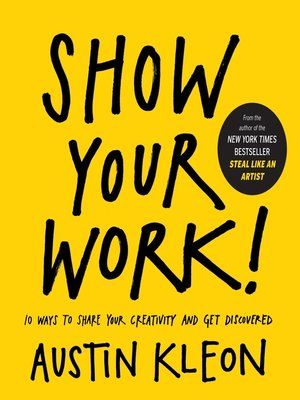Show Your Work!: 10 Ways to Share Your Creativity and Get Discovered
Austin writes about how he believes that everyone should be taking advantage of the world around them by putting their work online. This book was one of the main driving forces behind me starting my blog. I highly recommend this for anyone wanting to start or blog, website or YouTube channel.

Author: Austin Kleon
Rating: ⭐⭐⭐⭐⭐
Link: Amazon
1. You don't have to be a genius
Rather than questioning whether you are intelligent enough or good enough at what you want to share instead you should ask what you can do for other people. Everyone should find (or start) a scenius to be a part of. A scenius is a model created by musician Brian Eno and is defined as a collection of individuals bringing their own strengths to a field while supporting, copying and improving other people's work. Find a community, be a part of the community and add value to it.
Most people avoid being classified as an amateur by James recommends being an amateur. Amateurs don't worry about making mistakes like professionals do, they do the work because of love and passion whereas professionals do it for success and money. Professionals suffer more from mistakes than an amateur ever will. Amateurs know that contributing something, no matter how silly, is better than not contributing anything through fear of being seen as silly.
The best way to start sharing is to learn in public. Find something you are interested in learning and commit to learning in front of others. Post updates of your progress and find others on the same journey, create a community and a scenius for your chosen field. Often people going through similar challenges are better teachers than experts as they are able to empathise with the struggles as they have more recently been through them than the expert.
Adopt the mindset of "If it's not online, it doesn't exist." This alone should be enough of a reason to start sharing your work regularly. Don't miss the opportunity for others to see your work just because you haven't shared it.
2. Think process, not product
Not everything in the world is about the end result, a lot of it is about the journey, particularly where people's interests are involved. People want to see a process, so share yours. Document everything you do by journaling or using a notebook or taking photos, it doesn't really matter how you decide to do it what matters is that you do. Once documented you can then share that journey. Journeys create deeper connections with people than end results ever will, share your journey.
3. Share something small everyday
Don't show everything, show your work. Don't share photos of your lunch, unless it's with a colleague discussing future projects you can talk about, share your work journey; that's what people are interested in.
By sharing something small each day you create a flow of content and stay relevant in your communities, then when you post a big piece of work your peers are going to be more receptive. Being an "overnight success" is very unlikely so start small and be consistent, build up a habit of 1% gains (Atomic Habits) and before you know it you'll be well on your way.
Don't worry too much about quality. "90% of everything is crap" Theodore Sturgeon. If the same is to be said about your work then the only way to increase the volume of good work is by increasing the volume of ALL work you share. Think of your sharing as two complimentary states: flow and stock. Flow is your quantity, your daily posts and stock is your quality, well produced content, but they help each other. Small posts every day (flow) can find what your audience is interested in and your big content (stock) dives into those interests and keeps the audience coming back for more.
Don't fall into the trap of thinking you don't have time. Sharing your work could take some time in your lunch break or you could use your commute home to share. But the most important thing to do is to make sure your sharing doesn't stop you from doing the work.
Own your own space. Go online and find a domain that suits you (E.g. www.[Yourname].com), find some hosting and build your website. A website/domain is your 'slice' of the internet and you can do whatever you want with that slice. There are lots of YouTube tutorials and blog posts about starting to build a website in the modern day so be sure to have a look at those before diving in.
4. Open up your cabinet of curiosities
Share what influences you and don't be afraid to share all your interests. There should be no such thing as a "guilty pleasure" there should only be pleasure.
If you are going to curate other people's work then you need to attribute that work to the person who created it, the easiest way to do this is by adding a hyperlink to the creator's website or the original post. People are lazy, make finding the context as easy as possible for them.
5. Tell good stories
Your work could be amazing but if you can't tell the story of the work people won't find value in it. How you tell the story will effect how people feel and what about your work they understand, only by understanding your work will they find true value. To be more effective when sharing become a good storyteller.
6. Teach what you know
Often we are put off teaching others what we do well through fear they will copy it and take credit and the limelight from us. What we need to do instead is feel free to teach others because just because others know how to do something it doesn't mean they have the experience to do exactly what you do. Carpenters don't go to college and immediately master the craft, it takes years of experience to truly master a craft like that. Think about how you can add to the field your work falls into and what better way to add to it than by attracting others to work in the same field as you. Teaching doesn't subtract from your work, in the long term it adds to it.
7. Don't turn into human spam
Don't demand respect and fame from anyone. If you want a community to respect you then you must earn that respect by showing up and respecting others already active there. Be a good citizen and in turn the respect will come to you, with that respect you will meet people with a wealth of knowledge and various passions that you can then call on when needed. "Who you know" is a common phrase when talking about what's important in life and by being a good citizen you will find more people to engage with.
Become more interesting. The way to do this is by being more curious and paying more attention to the world around you. In essence, to be more interesting, be more interested. Another way of being more interesting is to make stuff you are passionate about, this will naturally bring other people to your work. Your passion will attract those passionate about similar things.
When you find people who share your passions and obsessions don't keep things secret, explore your joint passions together, share with them what you won't share with others and use each other as a springboard for greater work. Once you have found these people endeavour to meet them in real life. You remove the need for small talk, because you already know what each other are doing, and go straight into talking about big ideas, goals or passions.
8. Learn to take a punch
Everyone gets criticised, it is unavoidable. Even if it were avoidable you wouldn't want to avoid it, "compulsive avoidance of embarrassment is a form of suicide." - Colin Marshall. If you spend your life avoiding vulnerability
Whenever you put work out for people to see someone is going to criticise it, whether you know them or not it will happen. The more people who see your work the more people will criticise you. There are people in the world out only to criticise others, these people are trolls and don't deserve your work. If you want to listen to any evaluations listen to the people who know both you as a personal and you as the creator of your work, they will be able to give you honest evaluation and constructive criticism to help your work improve.
Things to remember:
- Your work is something you do, it isn't who you are
- Social media block buttons were made for a reason, don't be afraid to use them
9. Sell Out
Don't think of selling out as being a negative thing. If you get an opportunity to do more of what you want to do, say yes. If you are offered more money to do less of what you enjoy, say no.
Be as generous as you but you still need to get your work done.
10. Stick around
At the end of each project ask yourself "what's next?" because one success doesn't mean your next project will be a success and more importantly one failure doesn't mean your next project will be a failure.
Make sure you don't burn out. Be sure to take a rest of sabbatical when you need it, there's no point burning yourself out, you're in a marathon, not a sprint.
With any luck everything you do now will be embarrassing when you look back in 12 months time because you will have learned so much that you would change almost everything about what seems the best plan now.
My Biggest Takeaways:
- If it isn't online it doesn't exist.
- You don't need to be a genius. Be part of something bigger, be part of a scenius.
- Learn to take a punch, people are going to criticise you but your work isn't who you are it's what you do. "Compulsive avoidance of embarrassment is a form of suicide."
- Be more amateur.
- People care more about the journey than the end result.

